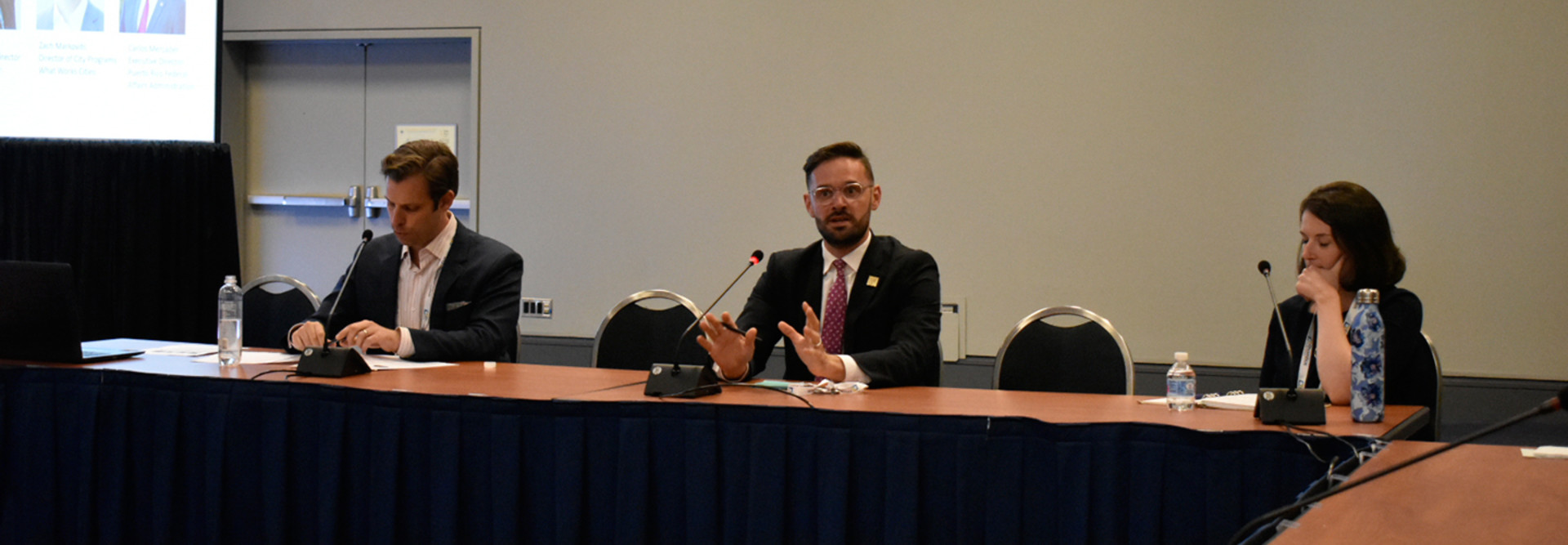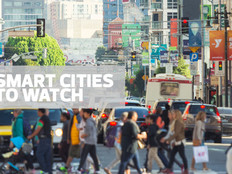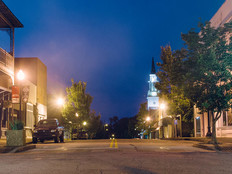Smart Cities Week 2018: Tech and Data Can Make Cities More Resilient
When Atlanta was struck by a ransomware attack in March that crippled many of the city government’s systems, it underscored the need for cities to be resilient in the face of all kinds of challenges — including, but not limited to, cybersecurity.
That is the perspective of Kevin Bush, chief resilience officer for the District of Columbia, who spoke Oct. 3 at the Smart Cities Week 2018 conference in Washington, D.C. Resilience, to Bush, is the city’s “immune system,” and smart cities need to probe where their immune systems are weak and strong and how capable they are of handling technological change, climate change, and changes in their populations and economies, he said.
“The only way we can prepare for those changes, to thrive in the face of those changes, is to deal with chronic stresses,” Bush said during a panel discussion at the conference.
Erin Gill, the director of the office of sustainability for the city of Knoxville, Tenn., said that the municipality’s proximity to Oak Ridge National Laboratory has set a tone of innovation and progress for the city. “My role is to bring innovation theories and technologies into long-entrenched bureaucratic systems,” she said, including engineering and sustainability solutions.
Gill also said that it is important for cities to break down silos and share data across departments to develop better services for residents and improve resiliency.
DOWNLOAD: Find out how your city can achieve digital transformation in this CDW Insight Report!
D.C. Focuses on Technological, Cybersecurity Resilience
In 2016, Washington, D.C., was selected from more than 1,000 cities around the world to become part of the 100 Resilient Cities network, a program from the Rockefeller Foundation dedicated to “helping cities around the world become more resilient to the physical, social and economic challenges that are a growing part of the 21st century.”
In July 2017, Mayor Muriel Bowser named Bush to be the city’s chief resilience officer to lead citywide resilience efforts in partnership with the 100 Resilient Cities Network.
Bush likened his office’s work to that of a doctor who gave the District a physical. The office conducted a preliminary exam and diagnosis, then ordered additional tests. It helped set up five working groups, made up of members from the D.C. government and those outside the government.
The working groups have been examining how technological automation and artificial intelligence will impact the city’s workforce and economy, how people and goods move through the city and cybersecurity resilience.
As the city deploys more Internet of Things sensors, it will increasingly need to build up its cybersecurity resilience, Bush said. George Washington University’s Cyber Hub is involved in the city’s cybersecurity working group.
“We need to think about intrusions and bouncing back from an attack,” Bush added. “What is your fallback and plan to get technologies back online?”
To keep up with the challenges every major urban environment is facing, D.C. needs to “have access to the best tools to make decisions as efficiently and effectively as possible,” Bush said.
The District has conducted several smart city pilots, including Cisco Systems’ “Lighthouse” program, in which the city deployed a number of sensors on streetlights that allowed the streetlights to be dimmed if there was no traffic going by, for example. The city is in the process of setting up a public-private partnership to roll out new streetlights that will be outfitted with D.C.’s gigabit Wi-Fi, Bush said. Those lights will serve as network nodes that will allow the city to deploy more IoT sensors for smart city projects, he said.
JOIN THE CONVERSATION: Follow @StateTech on Twitter for continued Smart Cities Week 2018 coverage!
Knoxville Embraces Energy Efficiency
Gill noted that in 2013, Knoxville worked with IBM's Smarter Cities program and received $100,000 technical assistance grant. That work opened up conversations between traditionally siloed entities in the city, including its utilities board, homelessness and social service providers and others. All of them had their own data silos and some still had data only on paper records, she said.
However, by integrating that data, Gill said, Knoxville was able to more effectively target low-income homes for weatherization to improve their energy efficiency. Knoxville was able to scale up the weatherization program from 30 homes a year to 1,300 in 20 months, she said, through the Tennessee Valley Authority-funded Knoxville Extreme Energy Makeover, though that program has ended.
This summer, the Knoxville Utilities Board, along with its partners at TVA, Knoxville-Knox County Community Action Committee and the city of Knoxville, announced it would introduce Home Uplift, a program in support of KUB’s Round It Up initiative to provide weatherization assistance for low-income households in the community.
“One entity does not have enough money to solve the problem,” Gill said. Funds need to be aggregated and agencies need to get their interests aligned. “If you can’t aggregate funds, then you are not moving the needle, which is what we have to do.”
Bush agreed, and said that “in order to be resilient, you have to be integrated.”
Keep this page bookmarked for articles from the event. Follow us on Twitter @StateTech, or the official Smart Cities Week handle, @smartccouncil, and join the conversation using the hashtag #SmartCitiesWeek.









